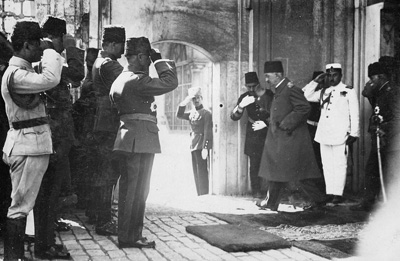
In these current circumstances in which the argument of the Islamic caliphate has come to the fore, we may usefully cast our minds back to what took place following its abolition in 1924 by the founder of the modern Turkish state Mustafa Kemal Ataturk.
The last Ottoman caliph Sultan Mehmet VI exiting the Dolmabahçe Palace in 1924
AT THE TIME the decision to abolish the caliphate stirred up feelings of fear, anxiety and questioning among many Muslim circles from as far afield as India and North Africa, in that the institution of the caliphate represented for these people the continuity of the Islamic entity, in the face of the fragmentisation of the space – in which Muslims for many centuries had lived – into many states and political entities. For during the centuries previous to this the idea, for some, of an implicit ‘obligation’ to a caliphate, while not expressly stated in the texts, was taken as an assumption on a practical level. This duty was one of allegiance to a caliph chosen according to a process approved of by the religious scholars, and tasked with ensuring the establishment of Sharīʻa rulings and “defending the religious community and the Nation.” The idea was that the Caliph represented the highest authority over the Muslim masses, whether on the religious, spiritual level or the worldly, political level.
Many Muslim authorities wondered what might be the fate of the Nation, if there was no longer a caliph to keep it together in the face of political fragmentation, and to preserve its links with its religious heritage. Would the Islam as practised by the general public be acceptable and effective if they did not uphold the Caliphate, or pledge allegiance to any imam? Would they not face the risk of disintegration, fragmentation and marginalization? These were some of the urgent questions raised which unsettled some of the perceptions that many jurists, scholars and authorities relied upon and sought to defend.
Those calling for ‘Islamic’ regimes had to employ complex interpretative approaches to solicit what they wanted from the Text
At that time, while some convened conferences with the aim of breathing new life into the institution of the caliphate by entrusting it to one of the prominent rulers on the scene, there appeared a book by Shaykh ‘Alī ‘Abd al-Rāziq, a scholar of Al-Azhar, entitled Islam and the Foundations of Governance: an Investigation into the Caliphate and Government in Islam. The work was not intended to reassure some people or express disparagement of this or that proposal, or goad others into taking a particular course of action or anything like that (as was the case with most of the writings of Muslim intellectuals of the time) but to find a clear solution to a question that played an important part in Muslim history, and put an end to all questions, or rather wild guesses and speculations on the subject. Shaykh ‘Alī ‘Abd al-Rāziq wanted to provide a kind of ‘definitive treatise’ on the issue of Islam and politics and everything in between, by clarifying the arguments and furnishing clear-cut evidence that would remove any doubt, rather than add yet another tranche to the statements, comments and interpretations accumulated over centuries by generations of writers and politicians.
The question Shaykh ‘Alī ‘Abd al-Rāziq wanted an answer to was: What constitutes caliphal rule? And following on from that, what was the Islamic faith’s perspective on matters political? Should the establishment of the caliphate be considered obligatory, or a duty, incumbent upon Muslims or not?
Shaykh ‘Alī ‘Abd al-Rāziq began by reviewing the Qur’ānic verses that may be interpreted as presenting rulings or rules or indicators concerned with the system that the Muslim community is enjoined to establish, or any arrangements incumbent upon Muslims to adopt in organizing public life. He came to the conclusion that there were no provisions, rules or indicators of that nature. Then, after a similar review of the prophetic hadith generally adduced when discussing the political dimension, Shaykh ‘Alī ‘Abd al-Rāziq reached the same conclusion and demonstrated that the fundamental texts the Muslims relied upon as the basis of their religion did not provide any guidance on what was to be the political organization of the Muslim community.
He showed that there existed no political obligation imposed on Muslims by the sacred texts, and that no arrangements or foundations existed for any system supposed to be established.
And that was a fact well-known to the Muslims, in that those calling for ‘Islamic’ regimes had to employ complex interpretative approaches to solicit what they wanted from the Text. Shaykh ‘Alī ‘Abd al-Rāziq, however, turned to a detailed examination of the Qur’ānic verses and the Hadith which they were using to make their case, and thereby demonstrated how these sources were devoid of any of the indications ascribed to them. He showed that the reference to the duty of obedience to rulers and the Shura Council supposedly enjoined by the Qur’ānic verses were matters of general principle applicable to a variety of human societies, and could not be considered to be rules or arrangements determining the aspects of a particular political system.
He then took another look at the organization of Medina in days of the Prophet and demonstrated that it did not demonstrate any of the ingredients necessary for a political system of any sort, and that the nation formulated by the Prophet was a religious community not a political unit. The purposes behind its formulation was neither to innovate a kingship, nor to establish a state but rather to provide the conditions necessary for the life of a religious group that could distinguish itself from the surrounding tribal environment from which it originated. It based itself on different societal principles and established guiding religious rituals that were entirely dissociated from the paganism prevailing at the time.

Suggested Reading
Following on from that, Shaykh ‘Alī ‘Abd al-Rāziq recalled the conditions and the circumstances surrounding the establishment of the caliphate following the death of the Prophet, and demonstrated that at that time its establishment constituted an ijtihād – an exercise in independent juridical reasoning – on the part of a group of Companions, at a time when a number of other ijtihāds also made their appearance from other Muslim groups, but which were not adopted or imposed due to circumstances. Consequently Shaykh ‘Alī ‘Abd al-Rāziq demonstrated that the caliphate emerged as the result of the initiative of Muslims living in specific historical conditions, rather than as some obligation or religious requirement imposed by an explicit religious text.
It follows then that the caliphate and political activity in general belong to the realm of Muslim history and not to Islam as a religion. Muslims are therefore free to adopt or reject a political system, in that politics is a mundane issue to which religion can only contribute some general moral principles such as the requirement of obedience to rulers and the obligation for rulers to consult the wishes of the ruled.
The conditions and the circumstances surrounding the establishment of the caliphate constituted an ijtihād
A corollary of this viewpoint that reconsiders actual history and makes a distinction between the rulings of the faith and the acts of human beings, is that the caliphate – which became the central institution in many countries established by Muslims in varying geographical and historical conditions – is a mundane phenomenon that in some periods performed successfully but which, in other circumstances, also demonstrated negative effects. For the caliphate, the sultanate and all other political activities that adopted a religious basis or a religious reference, or made claim to religious justification, have been distinguished by the most extreme forms of repression and violence, both against Muslims and others.
The conclusion drawn by Shaykh ‘Alī ‘Abd al-Rāziq was that it is time for Muslims to take a new look at their history and make a clear distinction between the principles of faith and the works of Man. It is time for them to learn from human experience in the field of politics and adopt practices that demonstrate efficacy and benefit. That is, political systems that meet their needs and aspirations, not those that justify mistakes by using the name of religion.

